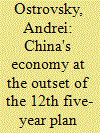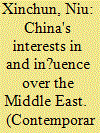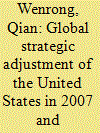| Srl | Item |
| 1 |
ID:
110051


|
|
|
|
|
| Publication |
2011.
|
| Summary/Abstract |
The 11th National People's Congress meeting for its Fourth Session in March 2011 passed a resolution calling for a prosperous society to be built in China by 2020. The country's efforts are to be focused on implementing the 12th five-year plan of China's socioeconomic development in the period 2011 to 2015 that is part of its economic strategy looking ahead to 2050 to make China second but to the U.S. in national strength. The country's economic development plan passed by its leaders for 2006 to 2010 and the amendments made to it as it went ahead helped China steer clear of the worst consequences of the worldwide financial crisis. To achieve its goals, though China will have to make a transition to an innovation-driven economy during the current 12th five-year plan period.
|
|
|
|
|
|
|
|
|
|
|
|
|
|
|
|
| 2 |
ID:
130608


|
|
|
|
|
| Publication |
2014.
|
| Summary/Abstract |
The Middle East became a critical region for China after 1993, when The Beijing became a net oil importer. From this point, it became enmeshed in the complicated regional situation. And so China must realize its basic interests and policy objectives in the Middle East as well as set up an overall, balanced, clear and long-term strategic framework. Policy choices should be made in accordance with such factors as diplomatic tradition, national strength and political ideology
|
|
|
|
|
|
|
|
|
|
|
|
|
|
|
|
| 3 |
ID:
080747


|
|
|
| 4 |
ID:
144671


|
|
|
|
|
| Summary/Abstract |
Israel is one of the only countries whose continued existence is called into question. The history of state death and particularly the record of state death since the end of the Cold War provide insights into the kinds of threats that are most likely to bring about the demise of countries in the twenty-first century, including Israel. This record suggests that armed conquest is no longer a principal danger to countries. Instead, state death is more likely to arise by a peaceful decision to end the state. The reasons for this decision vary case by case, but changes in the policy of a great power, ethnic strife, and a growing belief in the illegitimacy of the country’s right to exist have all played key roles in recent state deaths. Israel struggles with each of these issues, making the lessons of state death especially relevant for its future. By learning from the experience of state deaths, Israel can best assess its own vulnerabilities and determine what it needs to do to maximize its prospects for survival.
|
|
|
|
|
|
|
|
|
|
|
|
|
|
|
|